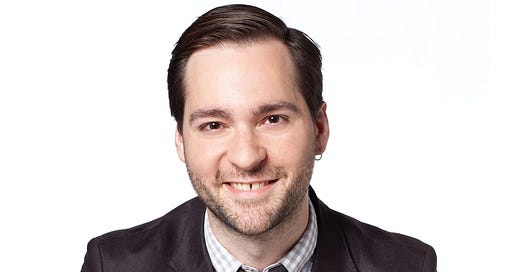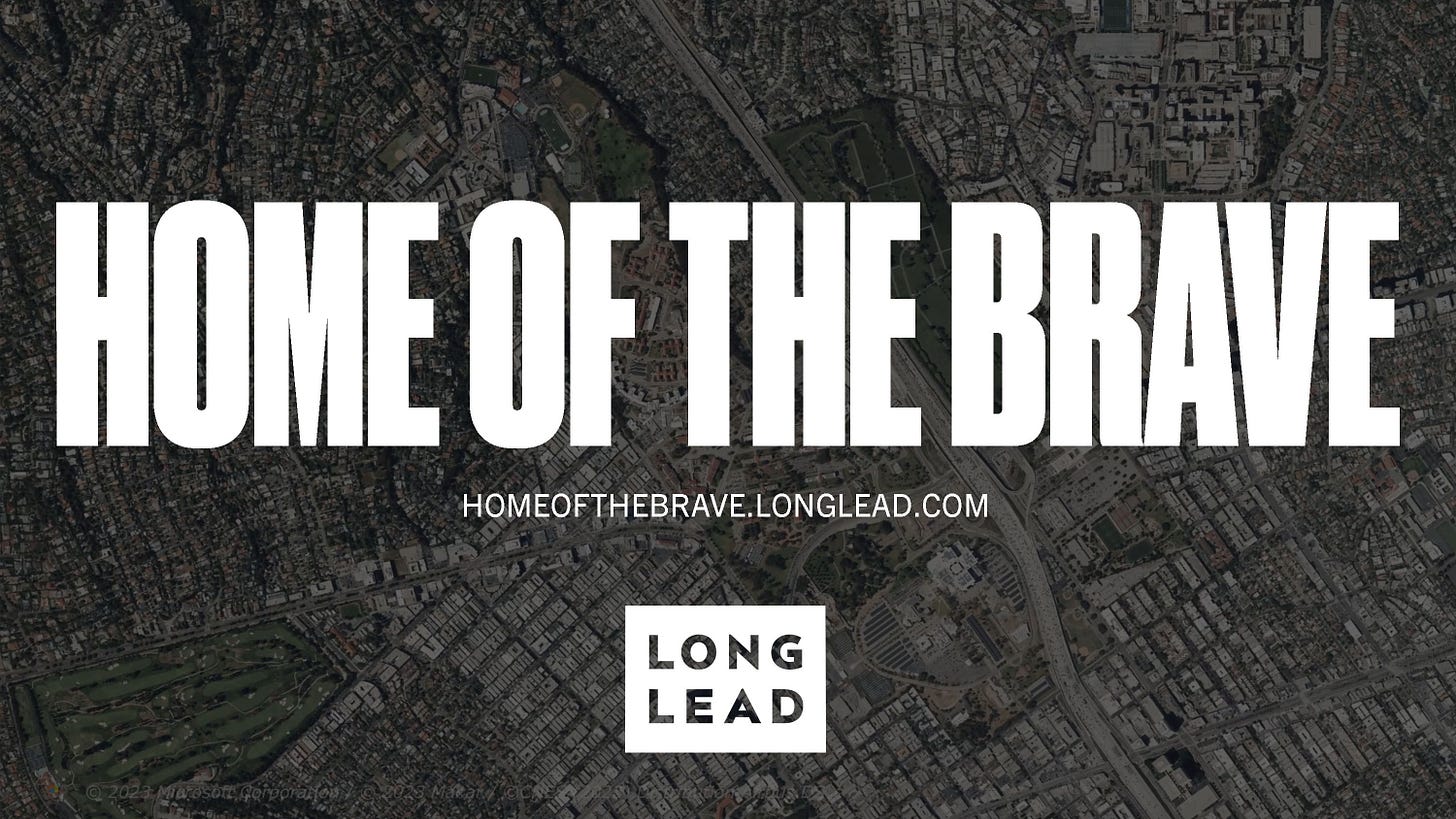Andrew Nusca: “Most of my proudest moments don’t carry my byline”
Fortune Brainstorm Tech’s editorial director on quality control, the “cheat code” that got him into journalism, and one weird trick to strengthen your reporting.
Today, Long Lead publishes “Home of the Brave,” a multi-part, multimedia examination of how the VA failed to stop a homeless veteran crisis of its own creation across five decades in Los Angeles. The production is a historical document and definitional text that also chronicles the actions of a band of disabled vets seeking to ensure that no one who served the country will live — or die — on its streets.
It is a powerful work crafted by a team of incredibly talented journalists and filmmakers. (To learn more about the project and the folks behind it, check out today’s Long Lead newsletter.)
One integral member of the “Home of the Brave” team is Andrew Nusca, who was an editor on the feature and wrote Part I, “Who Killed Andre Butler?”
Depth Perception caught up with Nusca, who now serves as the editorial director of Fortune’s tech and innovation Brainstorm community after holding roles at Activision Blizzard and Morning Brew. He joined us for some Leading Questions. —Parker Molloy
Why did you become a journalist?
I had no designs on doing journalism when I enrolled at New York University. I entered undecided on my major, with a vague sense that I might pursue law. Freshman year, I took a course called "Mass Media and Government," taught by journalist Jefferson Flanders, and I loved learning how politicians used communication tactics to manipulate voters' minds. It felt like discovering a cheat code.
Things moved fast after that. I declared journalism as my major (clearly, exposing those tactics was more attractive to me than practicing them). I started writing for the school's daily newspaper, the Washington Square News, then became its news editor. I secured an internship at Popular Mechanics, which I read growing up. (Thanks, Dad.) There, I fact-checked print galleys, wrote for the publication's nascent website, and fell in love with the collective creativity — text, image, layout — and process of putting together a magazine. I didn't look back.
What story of yours are you proudest of?
I've been an editor for most of my career, so most of my proudest moments don't carry my byline. If I had to choose one, I would say "The Shrinking Middle Class," an almost full-issue take over of Fortune magazine's January 2019 edition that was executed with the vocal and energetic support of editor-in-chief Clifton Leaf.
The package includes dozens of narratives presented in different ways, and in different mediums, by staff and freelancers across the country. We told intimate stories of people chasing the American dream, charted out the economic forces squeezing workers, explained how we got here and outlined how to fix it. It was a hybrid digital/print project from the start, a journalistic big swing with social impact, and the product of the work of more than 40 people. We were all enthusiastically rowing in the same direction because we wanted to.
An epic government scandal hiding in plain sight
It’s the story of a land grab dating back to the U.S. Civil War, bursting with government malfeasance, neglect, graft, and even death.
Experience “Home of the Brave,” now available on Long Lead.
What story of yours do you most regret?
I can't underscore enough to non-journalists how much quality control is instilled in the work. Every single story that runs with a correction, no matter how small or trivial, is a dagger to the heart. There is one feature I edited that carried a very long one — a hundred daggers — that was partly the result of a communication breakdown in the team tasked with creating it. I was and remain mortified by the error, but I am regretful about the process that allowed it to be made in the first place.
What’s the best journalistic career advice you ever received?
"Pick up the phone." This will sound silly to anyone who joined the profession before the Internet and alarming to anyone younger than, say, 30 at the time of this writing. But there remains a wealth of knowledge that isn't online. And you never know who might pick up.
What is the worst journalistic career advice you’ve ever received?
"If you want to get your start in this industry, you have to get a job at a newspaper in a small town in the middle of the country." That advice was ill-prepared for the media disintermediation of the 21st century.
What is a widely accepted journalistic rule or norm that you hate?
Paying your dues. I'm not saying that junior journalists don't need training and support — they do, as they always have. But the traditional hierarchies of publishers did more to preserve seniority than to facilitate the best storytelling. Now that everyone has a "publish" button on an array of platforms, it's easier for talented young journalists to get their work in front of an audience. Three cheers for that.
What was the most indulgent media event you've ever attended?
Well, I missed the infamous Talk magazine party in 1999, so that's out.
In all seriousness: My media career has been marked by austerity. I left journalism graduate school in 2008 to industry hiring freezes and a global financial crisis. I watched newspapers, then magazines, then broadcast television, then "new media," decline in the face of disintermediation. There have been lavish holiday parties over the years, but they almost always signaled an end.
“I can't underscore enough to non-journalists how much quality control is instilled in the work.” —Andrew Nusca
What’s one app, tool, or service that you can’t do your work without?
It's a cop-out to say my smartphone, but it's true. So I'll say TextEdit, the rudimentary word processor on Macs, in plain text mode. There is no better (and terrifying) way to get to the heart of an idea than to strip away all formatting, noise, and distraction.
What makes you think journalism is doomed?
Most of the business models of the companies that increasingly control media distribution directly threaten the ability of professional journalistic organizations to reach audiences and financially support their work, no matter how many profess otherwise.
Great investigative journalism is expensive, time-consuming, and an inherently wasteful activity. You will make calls that aren't returned, send emails that aren't replied to, and knock on doors that aren't answered. Without the business stability to take such risks, the practice is threatened.
What makes you feel hopeful for the future of journalism?
We are in a golden age of media consumption. We have never read more articles, listened to more audio, watched more video, and attended more events. And you no longer need a printing press or a sympathetic editor to tell the truth. A great story can come from anyone anywhere now that people have the equivalent of typewriters, recorders, cameras, and distribution channels in their pocket. That's good news for democracy — even if it makes us professionals a little nervous.
Further reading from Andrew Nusca
“Who Killed Andre Butler?” (Long Lead, June 11, 2024)
“Why a ‘collective conversation’ is so important for tech and AI right now” (Fortune, June 3, 2024)
“A high bar for health tech startups” (Fortune, May 22, 2024)
“Munchkin transformed once-mundane baby products with creative twists—and has now sold to nearly every American family” (Fortune, March 29, 2023)
“Elon Musk’s rocket ride“ (Fortune, Andrew Nusca and Michal Lev-Ram, Dec. 2, 2020)
“The Shrinking Middle Class” (Fortune, Dec. 20, 2018)









Andrew and I met in Philadelphia, when he was first starting out. Both bemused and amused that he's become such an icon, and still grateful to know him!